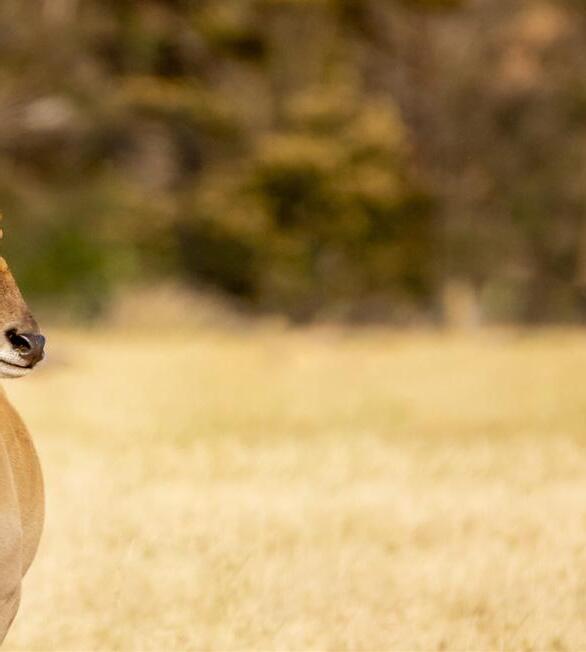







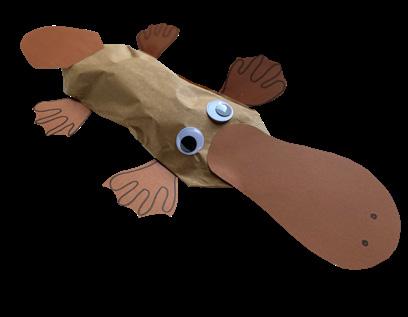
• Gardening Club 14 snack 11 • Detection Dogs HEY KIDS! Check out our competition on the back page 8 Craft your own AMAZING ANTELOPE HORNS page 4 Make a PAPER BAG PLATYPUS page 18
HAVE YOU HEARD? African Wild Dogs make a “chirping“ sound
DID YOU KNOW? Servals have the largest ears of any cat
I’m a Leadbeater’s Possum. Learn all about the animals at Werribee Open Range Zoo with me!
DID YOU KNOW? Leopard Tortoises can live to be 100 years old
African Wild Dogs Ranger Station African Village Leopard Tortoise Hippo Play Trail Dig Pit Kubu Queen Vervet Monkeys Lions Village Dance Party & Playground Billabong Lake Wbirre ee R i v e r Village Meerkat Bistro & Function Centre Trader AFRICAN R I VERT R A I L
ACTIVITY
YOU
AFRICAN RIVER TRAIL AT WERRIBEE OPEN RANGE ZOO.
RIVER
ADVENTURE
BRING THIS
ALONG WITH YOU THE NEXT TIME
VISIT THE
AFRICAN
TRAIL
ENTRANCE
MUST DO! Gorillas Keeper Talk 1.45pm every day MAIN
HOP TO IT!
Zoos Victoria PO Box 74, Parkville Vic 3052 P 03 9340 2780 / F 03 9285 9390 E members@zoo.org.au W zoo.org.au Zooper Kids is published for Zoos Victoria by Hardie Grant Media MANAGING DIRECTOR Nick Hardie-Grant ACCOUNT DIRECTOR Scott Elmslie EDITOR Jo Stewart DESIGN Dallas Budde and Kieran Medici Printed on FSC® certified paper with vegetable-based inks. Zoos Victoria is a carbon-neutral organisation and powered by 100% renewable energy. 2 2 For a digital guide to the animals and their habitats: Click here
1 WHAT IS THE NAME OF THE MALE LION THAT LIVES ON THE AFRICAN RIVER TRAIL?

Hippos
Hippo Beach Café
Hippo Beach & Water Play
2 I AM THE FASTEST MAMMAL IN THE WORLD AND YOU CAN FIND ME THE TRAIL. WHO AM I?

Crazy About Cats Meeting Point
Cat Maze
Cheetah
Gorillas
Bush Babies
Adventure Trail
3 WHAT IS THE NAME OF THE DESERT IN AFRICA WHERE MEERKATS LIVE IN THE WILD?

Zebras Rhinos
4 WHAT IS A GROUP OF WESTERN LOWLAND GORILLAS CALLED?
Camels
Safari Station
Bison
Ostriches
Mongolian Wild Horse
Giraffe Meerkats
To find out more about the Junior Safari Bus: Click here
Antelopes
KNOW YOUR FLAGS
The animals on the trail come from lots of different countries across Africa. Can you match the African country to its national flag?
BOTSWANA
ETHIOPIA
KENYA
SOUTH AFRICA
TANZANIA
5 WHICH ANIMAL ON THE TRAIL IS ALSO KNOWN AS THE ‘RIVER HORSE’?
Answers on page 17
3
A.
A.
A.
A.
A.
MAKE YOUR OWN ANTELOPE HORNS


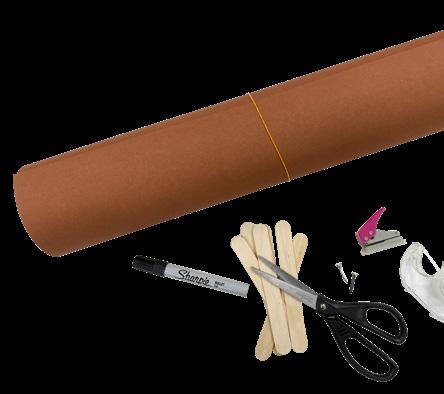
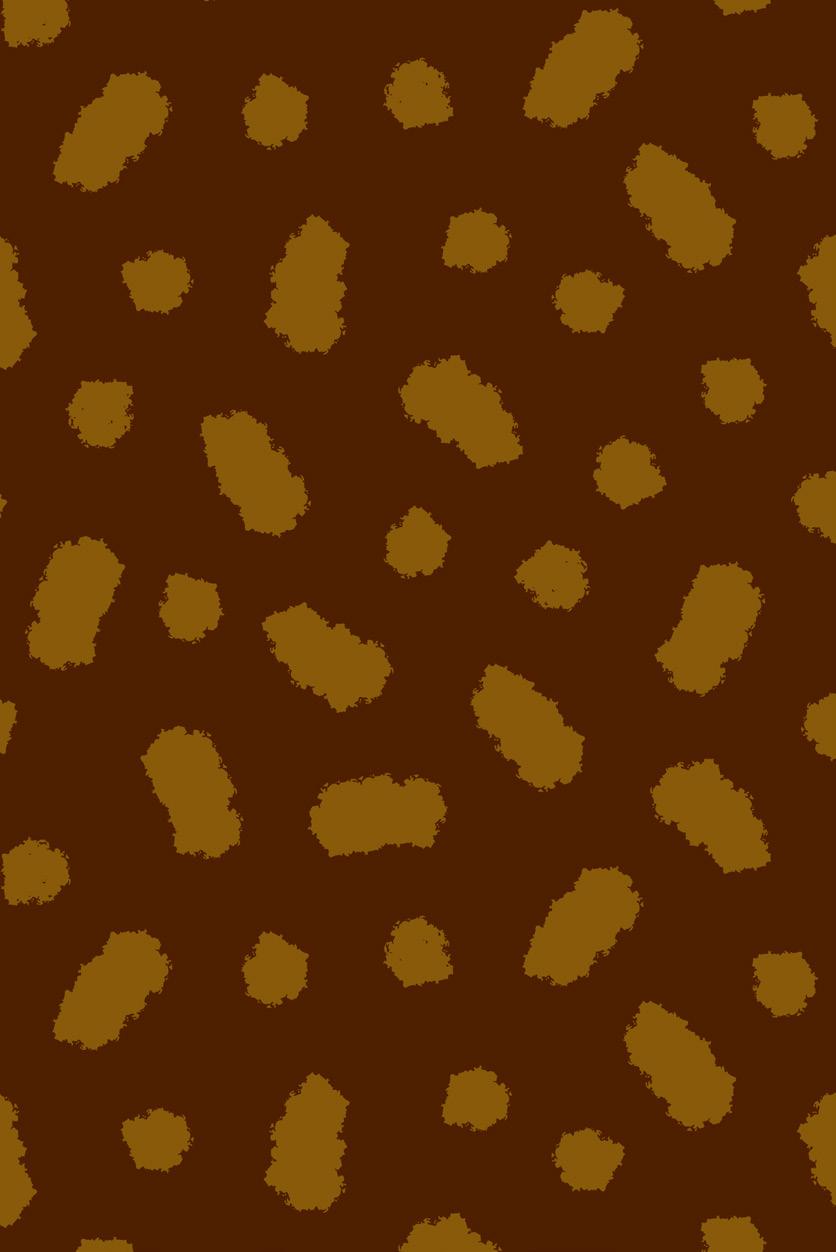
4
Pretend to be an antelope by galloping around!

1
Cut out a long thin strip of craft paper and punch two holes in either end. This will become a headband.




2
With the remaining craft paper, draw two antelope horns and cut them out.
3
Line up to three craft sticks together along the length of each horn and tape down.

4

Tape both horns to the headband.
5
Finally, add a split pin to each end of the headband and loop a rubber band around each pin.

5
insect keeper How to be an

Melbourne Zoo Insect Keeper Rohan is helping to save a very special animal: the Lord Howe Island Stick Insect, sometimes also called the ‘Tree Lobster’.

6
PUT NEW PLANTS OUT
Lord Howe Island Stick Insects like to eat a lot of plants. Each day, Rohan puts lots of new plants in the greenhouses for the insects to munch and climb on. The plants are all grown by the Melbourne Zoo nursery team, so they are very fresh and healthy. Rohan puts the plants in different spots each time. This gives the insects some variety and a new challenge to enjoy working out each day.
Have you watched the Octonauts episode on the Lord Howe Island Stick Insect?
SHARE THE STORY
GET AN EARLY START
Rohan is an early bird. He arrives at Melbourne Zoo at 6am to start his work. Keeping the insect habitats clean is very important, so Rohan cleans all the areas every morning.
DID YOU KNOW?
The Lord Howe Island Stick Insect was thought to be extinct for 80 years.

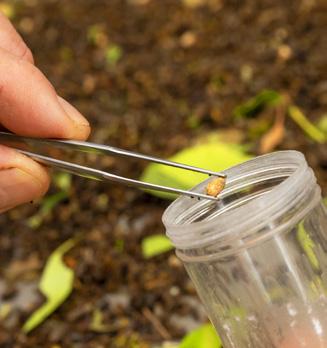
DO A MONTHLY COUNT

Every month Rohan counts all the Lord Howe Stick Insects in his care. This helps the team to keep track of how many insects are in the space. To do this, he looks at all the insects in each habitat, making sure to check inside nest boxes and under branches and leaves to find any that are hiding.
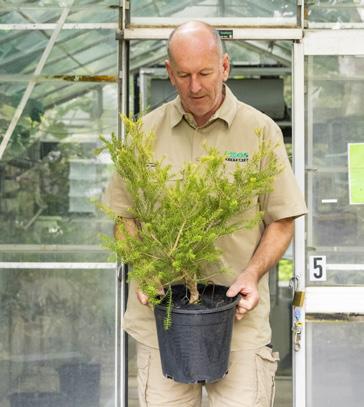
TAKE CARE OF EGGS
To breed the insects, Rohan collects insect eggs from the habitats and buries them in sand, just like the insects do in the wild. He keeps the eggs at the perfect temperature, then waits for them to hatch a fresh batch of tiny, green stick insects. As they grow into adults, the insects get much bigger and turn black.
The Lord Howe Island Stick Insect is very rare. There aren’t many left in the wild. A part of Rohan’s job is visiting schools to talk to children about the insect. He’s even written a children’s book called Phasmid to share the amazing story of the Lord Howe Island Stick Insect. You can buy the book at the Zoo Shop.

Visit the Lord Howe Island Stick Insect Playspace behind the Butterfly House at Melbourne Zoo.
7
COLOUR-ME-IN WILDLIFE DETECTION DOG SQUAD

Kip and Finn are very important members of the Zoos Victoria Wildlife Detection Dog Squad. These clever pooches help scientists to find native animals in the wild, so they can monitor their health and behaviour.

KIP FINN 8
The Detection Dog Squad has been trained to find lots of different species, like the Critically Endangered Baw Baw Frog.
Check out our super cute plush toy and hand puppet pooches in the Zoo Shop: Click here
9
RAINBOW SMOOTHIE BOWL

WHAT YOU’LL NEED
Smoothie mix:
200g frozen mixed berries
1 banana
250ml milk
Peel the banana and add to the blender along with the frozen berries
Green kiwi fruit


Red strawberries


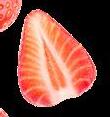
Add your favourite rainbow coloured toppings!
Orange mandarins

Blue blueberries

LET’S COOK! ZOOPER KITCHEN
10
SAFARI SNACK

WHAT YOU’LL NEED
A ripe pear


Toothpicks
Green grapes
White mini marshmallows
Liquorice

Remember to always ask an adult for help when using a knife.
1

Using a sharp knife, carefully cut a pear in half and cut a green grape in half.





2
Push two toothpicks into the front underside of the pear where the teeth will go. Then thread a mini marshmallow through the toothpick to form the teeth.
3
Push two toothpicks into the front of the pear to make nostrils. Then thread through the grape halves to make the nostrils.

4
Push two toothpicks into each side of the top back of the pear. Then thread through two whole grapes on each side to make the ears.
5
Squash two mini marshmallows down onto the top to make the eyes. Then place a tiny bit of liquorice on top of the marshmallows to complete the eyes.
11
BIRD WORD is the
How much do you know about birds? Test your knowledge with this game of elimination. Simply cross out the birds described in each of the clues below. When you get to the end, there will be one bird left. What is it?
To find the answer, cross out:
1 All nocturnal birds
2 All flightless birds
3 All parrots
4 All waterbirds
Answer:
LITTLE PENGUIN
PLAINS-WANDERER
EASTERN ROSELLA
BUDGERIGAR BARN OWL
12
EMU
HONEYEATER
PELICAN
REGENT
RAINBOW LORIKEET
PINK COCKATOO
CASSOWARY
SPOT THE DANGERS

From seals to waterbirds, Melbourne Zoo’s Marine Response Unit helps rescue and treat sick and injured marine mammals. Once the animals have been treated by the vets, they are released back to the wild. There are 5 things that can harm marine animals in the picture below. Can you spot them all?

ILLUSTRATION BY GREGORY ROBERTS 13
Native Wildflower

SEED BOMBS STEPS

If it’s wet and cold, you might not want to spend much time outside in your garden. Winter is the perfect time to make some native wildflower seed bombs instead! Seed bombs can be stored for up to a year, so make some now to sow later on.


WHAT YOU’LL NEED 1
Put the half clay and half soil (or compost) in a mixing bowl, then add the seeds and some water so that it feels a bit moist.


Native wildlife seeds, like billy buttons, everlasting daisies, blue lace flowers or native wisteria
Dry the bombs on some paper set on a sunny, airy spot, like a windowsill. Turn the seed bombs every day or so to make sure they dry evenly.
ZOOPER KIDS GARDENING
CLUB
14
Now it’s time to get dirty! Mix together with your hands until the mixture feels like dough.
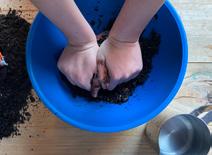
WATER QUIZ

Water is really important because we need it to drink, clean, cook, grow plants and keep the environment healthy. Saving water is something we can all do every day, by having shorter showers and turning off taps when we’re not using them.
1
A running tap uses how much water in one minute?
A) 2 litres
B) 10 litres
C) 12 litres
D) 16 litres
How many litres of water does the average person in Melbourne use at home each day?
55 litres
71 litres
159 litres
Once the seed bombs are totally dry, package them up in some brown paper and string to give to your neighbours and friends.



Don’t forget to wear a mask while using potting mix
How much do you know about water?
Take this quiz to test your knowledge!
5 What is the name of the creek that flows through Healesville Sanctuary?
A) Badger Creek
B) Beaver Creek
C) Wombat Creek
D) Pookila Creek
6
225 litres
How much of the water used at Melbourne Zoo is recycled at the Zoo?
10%
25% 30% more than 50%
Werribee’s Western Treatment Plant produces how many litres of recycled water each year?
90 million litres
40 billion litres
75 billion litres
99 billion litres
7 8
How much of the earth’s surface is covered in water?
A) 30%
B) 50%
C) 60%
D) 80%
Starting with M and ending with H, which word describes what gardeners put on the soil to save water?
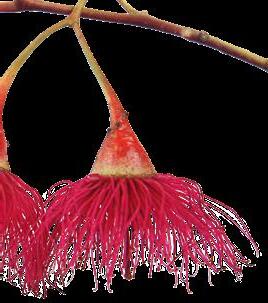
A) Mash
B) Marsh
C) Mosh
D) Mulch
What is the chemical formula for water?
A) H2O
B) WWW
C) W02
D) Hlx
Answers on page 17
2
2
MY WATER SCORE 8
5
15




16 CONGRATULATIONS to our winners! WOW! THANKS FOR YOUR ENTRIES To enter our next competition, send your picture to: zooperkids@zoo.org.au OR Zooper Kids Magazine PO Box 74, Parkville VIC 3052 See back page for all the competition details ELEPHANT PACK WINNER JAMIE AGED 7 FROG PACK WINNER LIZZY AGED 3
We love gettingpicturesyour and letters.
8 A O)2(H
7 D (Mulch)
6 D (80%)
5 A (Badger Creek)


3 D (more than 50%)
2 C (159 litres)
4 B (40 billion litres)
1 D (16 litres)
g(p 15)

WATER QUIZ
face mask, fishing line
Balloon, drinking straw, plastic bag,
g(p 13)
SPOT THE DANGERS
Regent Honeyeater
g(p 12)
BIRD IS THE WORD
Tanzania
South Africa
Ethiopia
Kenya
Botswana
5 Hippopotamus
4 A troop
3 Kalahari Desert (Botswana, Namibia and South Africa)
2 Cheetah

1 Sheru
sg(p 2–3)
TRAIL ADVENTURE
AUSTRALIANA PACK WINNER OLIVER AGED 5 COCKATOO PACK WINNER
11 17
ALISON AGED
Puzzle ANSWERS
AFRICAN RIVER
Make your own PAPER BAGplatypus


WHAT YOU’LL NEED
Brown craft paper or cardboard

Brown paper lunch bag
Black marker

Googly eyes
Scrap paper or newspaper
Glue
18
6
Glue the bill with the two nostrils and tail at each ends of the top of the paper bag.

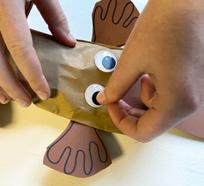
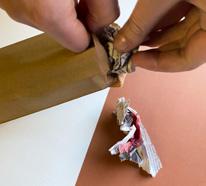
DON’T FORGET TO GIVE YOUR PLATYPUS A NAME!
Fold all four corners of the paper
3
Fill the bag with scrunched up spare paper or newspaper.
7
Glue the feet on the bottom of the paper bag.





5
Cut out the bill, tail and all four feet from the brown cardboard or craft paper.
8
Want to learn more about our platypus friends? Visit the World of the Platypus at Healesville Sanctuary:

19
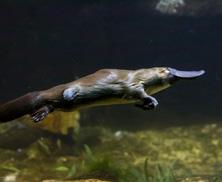 bag under.
bag under.
2
Use glue to add the googly eyes to the top of the platypus. No googly eyes? Draw some instead. 1
Draw some toes to create webbed feet and then draw a bill with nostrils and then finally, a tail.
STEPS
Click here




This competition is open to Zoos Victoria Members under the age of 18 with consent of a parent/guardian. Entries will be judged on individual merit and winners notified by phone or email. All entries become the property of Zoos Victoria and will not be returned to the entrants. Prizes are subject to change and cannot be transferred or redeemed for cash. Winners will be announced in the next edition of Zooper Kids ENtries close Sunday 16 July 2023 If you’d like a chance to win, send a letter or drawing to enter. Send yours to: zooperkids@zoo.org.au OR Zooper Kids Magazine PO Box 74, Parkville VIC 3052 $81 VALUE $90 VALUE $82 VALUE HAVE FOUR FANTASTIC PRIZE PACKS TO GIVE AWAY THIS ISSUE… GIVEAWAY! COMPETITION TIME! Remember to add your name & address to your entry so that we may contact you! LUCK!Good $71 VALUE
























































































 bag under.
bag under.







